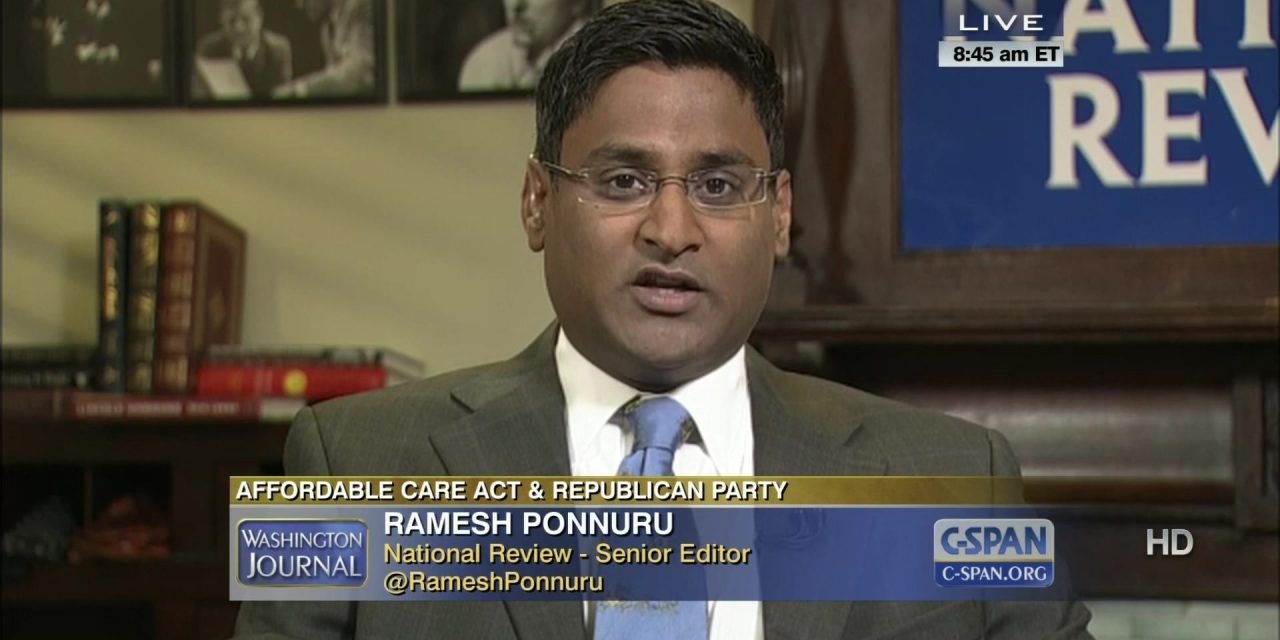Over at the National Review, Ramesh Ponnuru is on a real roll. I was interested to see that he seized on the same Paul Waldman excerpt that I highlighted yesterday when discussing Joe Biden’s shifting positions on the Hyde Amendment. Ponnuru’s commentary on it was as spare, however, as it was self-defeating and nonsensical.

This is a variation on the punching-yourself-in-the-face form of argument. Waldman argues that constitutional rights must have practical meaning in order to have any force. You can’t say that people have a right to counsel and then force them to stand trial without a lawyer if they cannot afford to pay for one. And you cannot say that a woman has a constitutionally protected right to have an abortion if there are women who cannot exercise that right for financial reasons.
Ponnuru might have made an effort to parse the difference between a sometimes optional medical procedure and a criminal trial, but he made a different choice. He tried to show that Waldman isn’t consistent in defending people’s constitutional rights. Waldman will defend the right to privacy, for example, but not the right to bear arms. It’s Ponnuru’s way of “owning the libs,” but he only wound up owning himself.
After all, if we are supposed to protect people’s constitutional rights and we are supposed to be consistent about it, then the argument for honoring the Second Amendment actually bolsters the case Waldman is making on access to abortion. If we concede Ponnuru’s point that Waldman is demonstrating a double standard, the remedy is not for Waldman to soften his position on the Hyde Amendment but rather for him to harden his position on the right to bear arms.
In a longer post published on Thursday, Ponnuru provided some thoughts on an essay Ben Sixsmith wrote for First Things about Frank Meyer and the fusion of libertarianism with a “moral commitment to traditional values” that defined the rise of the conservative coalition in the 1960’s. You may be interested in that debate or not, but I am only concerned with Ponnuru’s flawed uses of logic. Here’s how he concludes his piece:
I think Sixsmith misfires, or at least raises questions that deserved further elaboration, only in his conclusion. Fusionism has led to an economic liberalization, he writes, that “must be assessed against a background of rising rates of suicide and death by opioid abuse, and declining rates of birth and family formation.” Would these maladies be any less severe if we still had 70 percent tax rates or trucking regulation? Conservatives have long believed that “ideas have consequences.” But the line from Frank Meyer to the opioid epidemic is surely a meandering one.
So, here you have a person (Sixsmith) who is acknowledging that the successes of the conservative movement in the economic sphere, including massive deregulation, have coincided with a lot of troubling developments in our society. Perhaps these things are related. Perhaps there have been unintended consequences. Maybe we ought to examine any possible relationship between, say, less antitrust enforcement and stagnant wages, widespread unhappiness, smaller families, and the rise of nihilistic and self-destructive behaviors.
Ponnuru does not want to consider the possibility that someone might choose not to have a third child because they haven’t had any increase in wealth since the birth of their first child. He doesn’t want to contemplate that a supposed increase in “economic liberty” coincided with fewer opportunities to succeed as a small businessman against the resulting monopolies, and that this led to wage slavery, despair, drug abuse and suicide.
So, his answer is simply that a higher marginal tax rate and more trucking regulations wouldn’t have much hope of stemming the opioid crisis.
That’s rather aggressively missing the point.
In both of these posts, Ponnuru attempts to offer some kind of rebuttal, but his use of logic would earn him a flunking grade in an undergraduate philosophy course. The National Review publishes this drivel without the slightest sense of shame or standards, yet they continue to consider themselves intellectuals.




Anybody can be an intellectual. The hard part is being intellectually honest.
.
I actually think intellectuals are a very small and generally disadvantaged-by-natural-selection part of the human community.